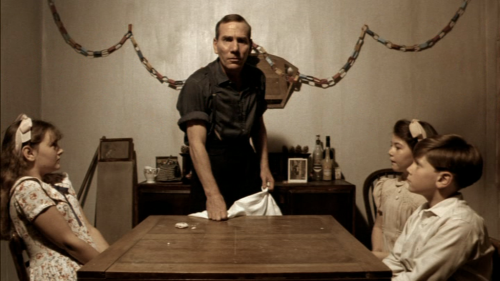Director: Terence Davies
With a runtime of less than 85 minutes it is astonishing how much this autobiographical work about a British family in the 1940's and 1950's actually accomplishes. It is in essence a portrait of a family (many of the shots are framed like family portraits), and Terence Davies gives us a complete portrait spanning decades in just 85 minutes. It seems like this movie should be a three hour epic, but Davies uses breathtaking efficiency, giving us a kaleidoscopically structured film that emulates the act of memory itself. The temporal structure of the film is hard to make out, but it all comes together in your own mind as a whole and lets you form your judgements yourself. The ephemeral efficiency of the film represents a truly unique masterclass in filmmaking by Davies. He gives us scenes that vary quite a bit when it comes to when they take place (in the first half at least), that tell us all we need to know about how this family of three worked. We learn how their now-dead very strict father's relationship was with each of the three children and their mother, how the children deal with his death, and how they continue on with their own adult lives.
The film really is completely unromantic and quite literally colorless. The colors are all dark, drab, and quite boring, representing a fairly mundane lifestyle that is only slightly cheered up by some group singing, usually in a pub. The music in the film is as important as any other aspect. Important music can live long in our memories, and so in the film the music tells us much about the character and how they lived their lives. For the characters themselves music is shown as a respite from all the bitterness and hardship that exists in Davies' depiction of post-war Britain. This is not a lavish Britain in which elegance pours over, this is a working class Britain hurt and ravaged by the memories of a war that came to their own doorsteps. Davies showcases this family, inspired by his own, as one of the many working class families of that time period that underwent what many families go through: pain, heartbreak, death, love, happiness, and regret. This impressionistic portrait of a family succeeds in such powerful fashion in showing what it really means to be a family, and how those complicated feelings we have towards our sometimes unreasonable family members always seem to inevitably come back to love.
Grade: A

No comments:
Post a Comment